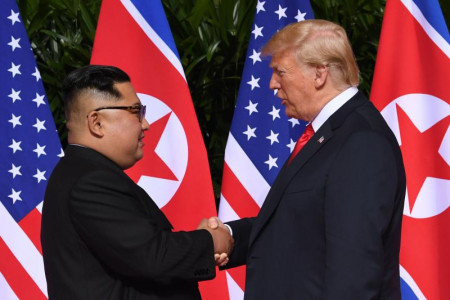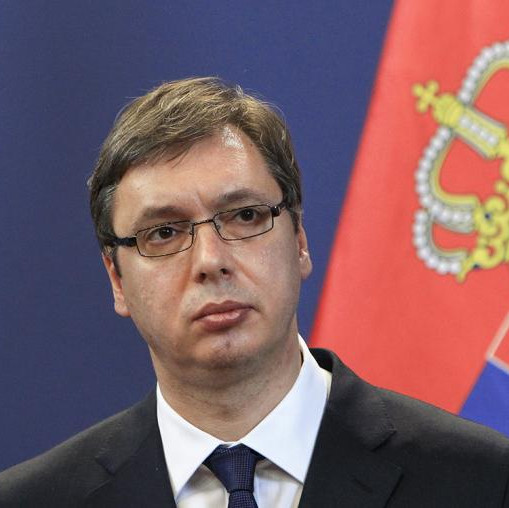
"President Trump will pursue the complete denuclearization of North Korea, just as he did in his first term," National Security Council spokesman Brian Hughes told Yonhap agency. "President Trump had a good relationship with Kim Jong-un, and his mix of toughness and diplomacy led to the first-ever leader-level commitment to complete denuclearization." Apparently, the dialogue between Trump and Kim Jong-un is about to resume, though still not in person and in a brand-new environment.
Right after his inauguration, Trump gave an interview to Fox News, saying he would contact Kim again, calling him a "smart guy" and "not a religious fanatic." Pyongyang reacted swiftly and to the point.
North Korean leader Kim Jong-un urged stepping up his country's nuclear force during a visit to a nuclear materials production base and a nuclear weapons institute, North Korean state media reported on Wednesday, publishing photos of his leader against the backdrop of cascading centrifuges.
Clearly alluding to the political crisis in South Korea and upheaval caused by Trump's return, Kim said his country was facing "the world’s most unstable situation in which a long-term confrontation with the most vicious hostile countries is inevitable," the official Korean Central News Agency reported. This situation "makes it necessary for the country to constantly strengthen its nuclear shield." Kim also dubbed the year 2025 "crucial" and "a turning point when we must complete while pursuing the line for boosting nuclear forces."
In short, no denuclearization is on the table as having created a nuclear shield, Pyongyang is never going to abandon it whatever the circumstances. The argument is strong enough: the fate of Libya, Syria or Iraq. "A world based on force and security through force is our choice, the most logical and just way to fight," Kim Jong-un said.
Meanwhile, last week, Trump called North Korea a "nuclear power," a term that American officials have avoided using because it could be interpreted as a recognition of Pyongyang's real nuclear status by the United States, which would fundamentally change attitude towards North Korea as a negotiating party. US new Defense Secretary Pete Hegseth also called North Korea a nuclear power during his confirmation hearing. All of this has fueled speculation that if Trump resumes talks with Kim, he may seek a deal that limits DPRK’s nuclear threats instead of pursuing the outdated goal of the nation’s total denuclearization.
Perhaps Trump and the new minister are not up to such subtleties now, but the White House has still made it clear (via Brian Hughes) that the United States is opposed to Pyongyang’s nuclear status. The two completely antipathetic positions imply that the dialogue on the issue must once again begin from scratch.
Just a reminder: during his first term, Trump met with Kim Jong-un thrice. At the first-ever summit in Singapore in June 2018, the parties agreed to work towards a "complete denuclearization" of the Korean peninsula and establishment of new bilateral ties. Now the White House interprets this broadly and ambiguously, saying "we have agreed on denuclearization." But this never happened, and things of the kind hardly promote trust.
Then there was the Hanoi summit in February 2019 and the meeting in the Demilitarized Zone between the DPRK and the Republic of Korea, in the village of Panmunjom in June 2019. The leaders were showing mutual sympathy in every possible way, but the dialogue on the DPRK's nuclear program didn’t budge an inch. Washington insisted on denuclearization, and Pyongyang demanded easing economic sanctions. No exchange occurred altogether.
On the other hand, Pyongyang surely aims to break through the sanctions regime that has been imposed on the DPRK both through the UN Security Council and at the bilateral level by all the major Western countries. The topic had always been part of the nuclear issue dialogue context. But now everything looks different.
Russia and the DPRK signed a Comprehensive Strategic Partnership Agreement during Russian leader Vladimir Putin’s visit to Pyongyang on June 18-19, 2024. The document was ratified and entered into force, replacing the basic treaty of friendship, good-neighborliness and cooperation dated February 9, 2000. This has been a breakthrough in North Korea’s international blockade.
Moscow's stance on sanctions has also become clear.
Russia will develop bilateral relations with North Korea, despite UN Security Council’s sanctions against Pyongyang, Russian Foreign Minister Sergei Lavrov said back in 2023. "We did not impose any sanctions on North Korea. They were imposed by the UN Security Council," he replied, urging to address this question to the council. "We will continue to develop equal and fair cooperation with the DPRK," Lavrov added.
In January, the Minister issued an even more comprehensive statement. "We aim to further actively work with our Korean partners on implementing current agreements focused on deeper and more comprehensive development of cooperation between Russia and the DPRK in a wide range of areas," the Russian Foreign Ministry told the media.
This clearly strengthens Pyongyang's stance in negotiations with Trump, which clearly devalues previous US demands to completely dismantle the Nyongbyon nuclear complex, abandon other nuclear facilities and programs, and sharply limit its missile program. And all of this amid the traditionally stable relations between China and the DPRK. The Trump administration’s bargaining point along the North Korean track has objectively got more complicated.
And subjectively, Trump is now rushing to beat Biden across the board, including in diplomacy with North Korea. But the key goal is still efforts to contain China. A question arises as to whether Pyongyang is really interested in negotiations with Trump. After the US presidential election, Kim Jong-un said the following: "We already did everything possible in the bilateral negotiations with the United States, and in the end, we became convinced that the superpower does not want to coexist with us."
Japanese media have been sharing rumors that Trump may alter his policy towards North Korea and try to convince Kim Jong-un to freeze further development of Pyongyang's nuclear and missile programs, instead of persuading him to eliminate his nuclear arsenal. Such an approach is deemed as departure from Washington’s long-lasting goal to denuclearize North Korea, which could fundamentally change security environment in Northeast Asia.
Any shift away from demands for a complete denuclearization and transition to talks on limiting the DPRK’s nuclear missile potential all but automatically pushes South Korea and Japan to acquire nuclear potentials of their own. And this would imply both the nonproliferation regime’s final collapse and Washington's loss of its security monopoly when it comes to its closest allies, who are also China's neighbors, by the way. Will Trump resort to this for the sake of deterring Beijing? Or will he press Pyongyang, whose missiles may well reach the cities of US east coast? What an unfortunate alternative!
Old twit Biden forgot about North Korea in fact, and it was so calm under his rule in this regard…


